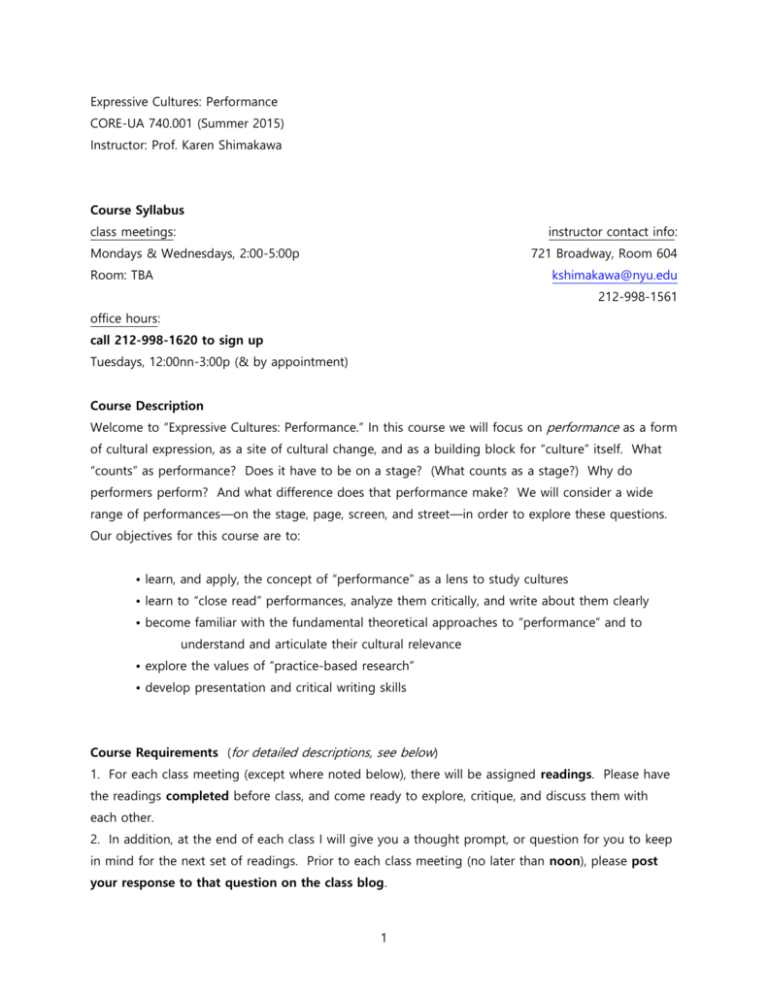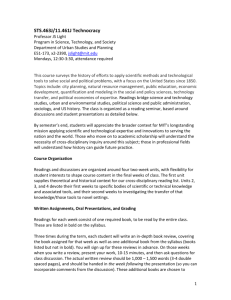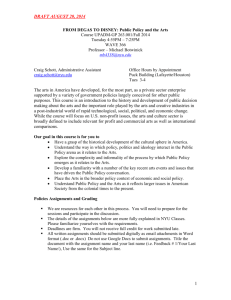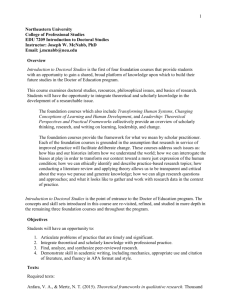Expressive Cultures: Performance
advertisement

Expressive Cultures: Performance CORE-UA 740.001 (Summer 2015) Instructor: Prof. Karen Shimakawa Course Syllabus class meetings: instructor contact info: Mondays & Wednesdays, 2:00-5:00p 721 Broadway, Room 604 Room: TBA kshimakawa@nyu.edu 212-998-1561 office hours: call 212-998-1620 to sign up Tuesdays, 12:00nn-3:00p (& by appointment) Course Description Welcome to “Expressive Cultures: Performance.” In this course we will focus on performance as a form of cultural expression, as a site of cultural change, and as a building block for “culture” itself. What “counts” as performance? Does it have to be on a stage? (What counts as a stage?) Why do performers perform? And what difference does that performance make? We will consider a wide range of performances—on the stage, page, screen, and street—in order to explore these questions. Our objectives for this course are to: • learn, and apply, the concept of “performance” as a lens to study cultures • learn to “close read” performances, analyze them critically, and write about them clearly • become familiar with the fundamental theoretical approaches to “performance” and to understand and articulate their cultural relevance • explore the values of “practice-based research” • develop presentation and critical writing skills Course Requirements (for detailed descriptions, see below) 1. For each class meeting (except where noted below), there will be assigned readings. Please have the readings completed before class, and come ready to explore, critique, and discuss them with each other. 2. In addition, at the end of each class I will give you a thought prompt, or question for you to keep in mind for the next set of readings. Prior to each class meeting (no later than noon), please post your response to that question on the class blog. 1 3. For one class session, you will give a brief presentation on a performance of your choosing related to the readings assigned for that day. (10 minutes maximum). 4. Papers: there are three short paper assignments: performance description (750-1000 words), a performance analysis (1000-1250 words); and a performance-based research project (1250-1500 words); and . You may choose to re-write one of these papers for re-grading. (Higher grade on revision will be averaged with original grade.) 2 Grading Your course grade will be determined as follows: class participation:1 20% blog posts: 20 performance presentation: 10 three short papers (15%, 15%, 20%) 50 TOTAL 100% Required texts All readings will be available via NYU Classes website. Assignment Schedule date assignment due topic(s) perf. presentation Goffman, The Presentation of Self, Ch. 1 & 6 M 7/6 Schechner, “Restoration of Behavior” what is “performance”? Shakespeare, Hamlet excerpts Austin, How To Do Things With Words, Ch. IW 7/8 III, XI performativity Butler, Gender Trouble, pp. 128-141 M 7/13 Chase, Law, Culture, and Ritual, Ch. 2, 3, 7 law as performance Murphy, “Lessons in Dance (as) History” [field trip: state/federal courthouses] Crowe, “The Relationship Between Theater and Religion” W 7/15 [guest lecture and Pellegrini, “Signaling Through the Flames” religion as performance Paper #1 (“Describing Performance”) due presentation by Prof. Ann Pellegrini] in class De Certeau, The Aesthetics of Everyday Life, M 7/20 Ch. 10 everyday life as Bourdieu, “Structures and the Habitus” performance Boal, “Poetics of the Oppressed” Fluxus, Workbook excerpts W 7/22 everyday performance, Lepecki, “Body As Archive” cont’d; embodiment Doyle, Hold It Against Me, Ch. 1 1 Note: “class participation” includes active, engaged discussion in class, timely completion of reading assignments, and on- time attendance. You are permitted ONE absence; subsequent absences or repeated significant late-arrivals will lower your participation grade. 3 Scott, Two Cheers for Anarchism, Ch. 1 Fuentes, “Zooming In and Out” M 7/27 Bryan-Wilson, “Occupational Realism” activism as performance Paper #2 (“Performance Analysis”) due in class Chaudhuri, “Animal Acts For Changing W 7/29 Times” objects and animals Gross, Puppet, “Prologue performing Haraway, When Species Meet, pp. 2-19 Casey, “Staging Meaning” M 8/3 performance and/in Luke, “Museums as Power Plays” museums Lepecki [reenactment] [field trip: New York Historical Society or MoMA] Adams, Sideshow, U.S.A., Ch. 1, 2 Thomson, “Dares to Stares” W 8/5 Parker-Starbuck, “Shifting Strengths” staging disability Paper #3 (“Fluxus Score performance research”) due in class M 8/10 performance and (new) Dixon, Digital Performance, excerpts media Bayart, Global Subjects, pp. 232-268 W 8/12 Manning, The Politics of Touch, excerpt Moten, In The Break, excerpt F 8/14 performance and the [field trip: Chinatown senses walking tour] (optional) revised paper due by email no later than 5:00p EST Assignment Descriptions/Grading Rubrics 1) reading/discussion participation: The class is structured in a discussion-based format which means I will be “teaching” primarily by asking questions based on the assigned materials. The quality of your experience of the class will only be as good as your participation makes it. I expect you to come ready with questions, reactions to the readings, etc. An “A” grade in this category means that you have read the assigned material carefully and critically, and can participate fully in class discussion based on your informed reading; a “B” grade means that you have the general contours and conclusions drawn in the material, even if some of the nuances and finer points of the argument are not quite there, and are able to ask questions that contribute meaningfully to your own and others’ understanding; a “C” grade means that you have most of the general arguments down but little more, and are generally following the conversation; a “D” grade means that you have the arguments wrong and/or are not (or are only intermittently) engaged in the 4 discussion; a “F” grade means that it appears that you did not do (or understand) the reading and/or are not in attendance.2 2) discussion board posts: At least one day (24 hours) prior to class I will post some kind of “prompt” (provocation or question) on the class blog, to which you are invited to respond (in the “Comments” section on the post). (Note: this does not mean that the posts should be long, formally composed, etc. – rather, it’s a question of the quality of thinking, not necessarily of writing.) I will not grade these posts individually—your grade will be based on your cumulative fulfillment of this assignment for the entire course. An “A” grade in this category means that you posted responses on time, every week that were responsive to the prompt and evidence serious thought and engagement. A “B” grade in this category means either that you (a) posted responses on time every week but not all of them evidence the active and engaged thinking described above; or (b) not all of your posts were submitted by the deadline but were of “A” quality. A “C” grade means that you did not submit all of the posts OR that the majority of your posts do not evidence active intellectual/critical engagement. A “D” grade means that you did not submit all of the posts AND the majority of your posts do not evidence active engagement. A “F” grade means that you submitted fewer than half of the required posts. 3) performance presentation assignment: For your assigned class meeting, you and a partner (or two) will seek out 2-3 performance examples (on YouTube or other video platform, website/image, or a written description of the performance) that relate to the readings/topic assigned for class that day. The two performance examples should illustrate different (or even contrary) points about the readings. You and your partner should present the example with minimum description—let the example speak for itself. After you present the examples, the class and I will ask you questions and invite you to discuss why you chose these examples, what relationship you saw between them and the assigned readings, etc. You and your partner(s) may work together on both examples, or divide them between yourselves. (Total presentation time: 30-45 minutes) An “A” grade in this category means that you have chosen an example that speaks to, illuminates, enlarges, or directly challenges, the readings in some way; and that your framing of the example makes that relationship clear to the class, and advances the class’s understanding of the reading thereby. A “B” grade means that you have selected an appropriate example and presented it adequately to the class, though without moving the class’s understanding beyond where it was when 2 Notes: (1) I do not disallow devices (computers, phones, etc.) unless they appear to be detracting from your or your classmates’ ability to participate fully in class -- in which case I will ask you to either shut them down or leave the class (if you must for some reason continue their use); (2) I have no objection to you eating or drinking in class as long as I cannot hear or smell it and you clean up after yourself. 5 you started. A “C” grade means that you have chosen an example that is related somehow to the general topic treated in the readings but does not directly engage with the argument/theory. A “D” grade means that your chosen example does not directly engage with the reading in any way. A “F” grade means that you did not do the assignment. 4) papers: All papers should be typed, titled (an original title specific to your paper, not the title of the assignment), double-spaced, stapled, and using correct and complete citation format (MLA or Chicago Style3). 4a) Performance description: the goal here is to hone your skills in describing performance as performance (as opposed to describing or summarizing the performance as if it were already text). Choose a performance (theatrical, everyday, or otherwise) and describe it in terms of the theories of “performance” and “performativity” outlined in the first two class meetings. (Due in class 7/15/15.) 4b) Performance analysis: This is a longer, more developed version of 4a. Choose a performance (other than the one you chose for 4a) and analyze it in relation to the theoretical approaches we have discussed thus far in class. (Due in class 7/27/15.) 4c) Fluxus “score” performance/performance-based research: choose one score from the Fluxus workbook and perform it as “practice-based research.” Describe what you did, and what the “doing” of it illuminated for you (that reading the score did not). (Note: it is incumbent on you to choose a score that does NOT require you to break the law or place you in unreasonable danger!) (Due in class 8/5/15.) An “A” grade in this category means that you have written a paper that evidences original and productive thinking on the topic, utilizing substantive original research (i.e., specific to your topic/argument of choice and beyond what has been assigned as class readings), and evidencing an ability to close read both your chosen “text” or case study and the secondary materials brought to bear on it. You should have a clear thesis and be able to marshal the evidence gleaned in that research effectively to make a compelling and persuasive case for your thesis, and the paper should be clear, organized, and polished. A “B” grade in this category means that your paper has elements of all of the above but falls short in one or two aspects. A “C” grade means that you have identified a topic that is relevant and workable, but have not composed a cogent argument about that topic, or 3 MLA: https://owl.english.purdue.edu/owl/resource/747/08/ Chicago: http://www.chicagomanualofstyle.org/tools_citationguide.html 6 gathered/assembled evidence in support of that argument. A “D” grade means that you do not have a workable topic. A “F” grade means that you did not complete the assignment in any respect. plagiarism Please familiarize yourself with NYU’s policy on plagiarism (in the Student Handbook and on the Tisch School of the Arts website (http://students.tisch.nyu.edu/object/tisch_acad_integ.html). Please make sure you understand what constitutes plagiarism, and how to avoid committing it. 7







